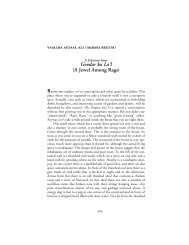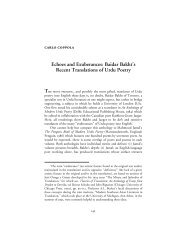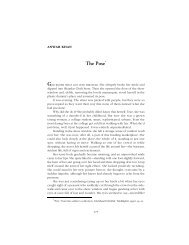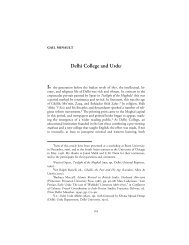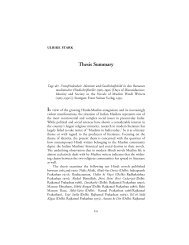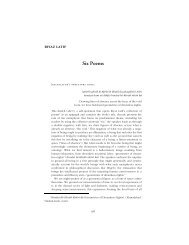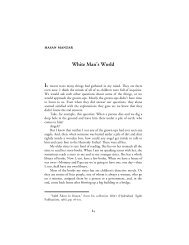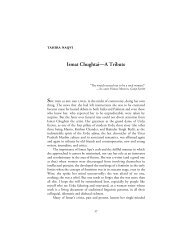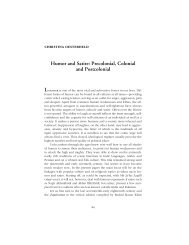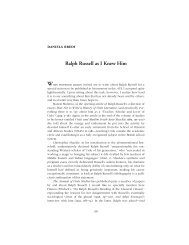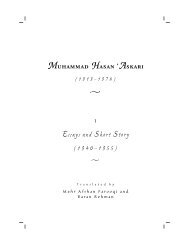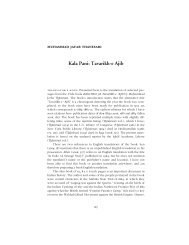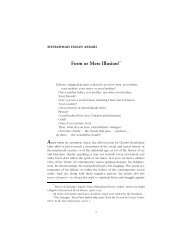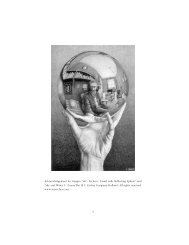Politics, Public Issues and the Promotion of Urdu Literature: Avadh ...
Politics, Public Issues and the Promotion of Urdu Literature: Avadh ...
Politics, Public Issues and the Promotion of Urdu Literature: Avadh ...
You also want an ePaper? Increase the reach of your titles
YUMPU automatically turns print PDFs into web optimized ePapers that Google loves.
ULRIKE STARK • 91nation with Cervantes’ Don Quixote, which had already inspired Fas≥na-e¥z≥d, <strong>and</strong> complete a long-cherished project <strong>of</strong> preparing an <strong>Urdu</strong> version<strong>of</strong> that great picaresque novel. His Khud≥’µ Faujd≥r was published from<strong>the</strong> NKP in 1894. 70It is difficult to reconstruct <strong>the</strong> various editors <strong>of</strong> AA after Sarsh≥r, <strong>the</strong>reason being a shift in <strong>the</strong> paper’s organizational structure. In <strong>the</strong> issue <strong>of</strong>11 February 1880 it was announced that in future <strong>the</strong> NKP would takecharge <strong>of</strong> <strong>the</strong> paper <strong>and</strong> no formal editor would be appointed. Instead, agroup <strong>of</strong> “excellent <strong>and</strong> experienced persons” would be employed to run<strong>the</strong> paper. 71How strictly this policy was adhered to cannot be said.Among those subsequently associated with <strong>the</strong> editorship were Ghul≥mƒasnain Qadr Bilgr≥mµ (d. 1884), Maulvµ A√mad ƒasan “Shaukat”M®raª^µ, Mirz≥ ƒairat Dehlavµ <strong>and</strong> Munshi D®bµ Parsh≥d “Si√r.” By far <strong>the</strong>most outst<strong>and</strong>ing figure on <strong>the</strong> editorial staff during <strong>the</strong> period, however,was ‘Abdu ’l-ƒalµm Sharar (1860–1926), <strong>the</strong> great <strong>Urdu</strong> essayist <strong>and</strong>cultural historian <strong>of</strong> Lucknow. Having spent his early childhood inLucknow, in 1860 Sharar joined his fa<strong>the</strong>r at <strong>the</strong> court in exile <strong>of</strong> V≥jid‘Alµ Sh≥h in Matia Burj, from where he contributed his first articles toAA. When, in 1880, he returned to Lucknow in search <strong>of</strong> a job, he waspromptly employed by Naval Kishore as assistant editor at a monthlysalary <strong>of</strong> Rs. 30. With Sharar as editor, AA went a step fur<strong>the</strong>r inaccording <strong>Urdu</strong> prose writing a prominent place in its columns, <strong>and</strong> alsogave increased coverage to subjects <strong>of</strong> cultural <strong>and</strong> social interest.Contributing articles on a great variety <strong>of</strong> topics, Sharar remained withAA until at least 1884, when we went to Haidarabad as a specialcorrespondent <strong>of</strong> <strong>the</strong> paper. Soon after, he started his own monthlymagazine Dilgud≥z. 72Next to its formal editors, AA also attracted <strong>the</strong> contributions <strong>of</strong>eminent <strong>Urdu</strong> literati, not least because it was among <strong>the</strong> first <strong>Urdu</strong>70 Mookerjee, p. 229.71 AA <strong>of</strong> 11 February 1880, quoted in Khurshµd, pp. 184–5. This also explainswhy from 1883 onward <strong>the</strong> SVN lists Munshi Shiv Parsh≥d, <strong>the</strong> manager <strong>of</strong> <strong>the</strong>NKP, as <strong>the</strong> editor/publisher <strong>of</strong> AA.72 Sharar’s famous literary controversy with Pan≈it Brajnar≥yan ≤akbast over<strong>the</strong> foremost ma¡navµ-writer <strong>of</strong> <strong>the</strong>ir times did not, as sometimes claimed, takeplace in AA but in <strong>the</strong> columns <strong>of</strong> Dilgud≥z <strong>and</strong> Avad^ Pan± in 1905. The NKP,however, published <strong>the</strong> debate in book form as Mub≥√a¡-e Gulz≥r-e Nasµm, Ya‘nµMa‘rka-e ≤akbast va Sharar (Lucknow: Naval Kishore Press, 1913).



